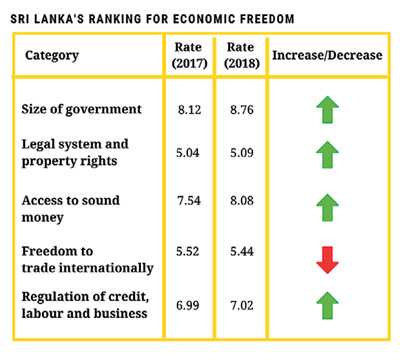Thursday Feb 26, 2026
Thursday Feb 26, 2026
Thursday, 17 September 2020 02:26 - - {{hitsCtrl.values.hits}}
 Sri Lanka ranks 83 out of 162 countries and territories included in the Economic Freedom of the World: 2020 Annual Report, released by Canada’s Fraser Institute in association with the Advocata Institute Sri Lanka. In the previous year Sri Lanka’s rank was 98.
Sri Lanka ranks 83 out of 162 countries and territories included in the Economic Freedom of the World: 2020 Annual Report, released by Canada’s Fraser Institute in association with the Advocata Institute Sri Lanka. In the previous year Sri Lanka’s rank was 98.
Hong Kong and Singapore top the index, continuing their streak as first and second respectively. New Zealand, Switzerland, the US, Australia, Mauritius, Georgia, Canada, and Ireland round out the top 10.
Research shows that people living in countries with high levels of economic freedom enjoy greater prosperity, more political and civil liberties, and longer lives. For example, countries in the top quartile of economic freedom had an average per-capita GDP of $ 44,198 in 2018 compared to $ 5,754 for countries in the bottom quartile.
Moreover, in the top quartile, the average income of the poorest 10% was $ 12,293 compared to $ 1,558 in the bottom quartile. Interestingly, the average income of the poorest 10% in the most economically free countries is more than twice the average per-capita income in the least free countries.
According to the Fraser Institute Report on Economic Freedom, Sri Lanka gained 15 places to be ranked 83 compared to the previous year where the country was ranked 98. Sri Lanka’s scores in key components of economic freedom (from 1 to 10 where a higher value indicates a higher level of economic freedom):
“It is noteworthy that this 2020 annual report is based on the data for 2018. If it were based on the data for 2018, 2019, and 2020, for Sri Lanka, there could have been a different score, most likely a lower rank and a smaller score compared to 83 and 6.88 for 2018,” commented Advocata Institute Academic Program Chair Dr. Sarath Rajapatirana.
“This is based on the categories: 1. Size of Government, 2: Legal System and Property Rights, 3: Sound Money, 4: Freedom to Trade Internationally, 5: Regulation. During this period the size of Government increased, freedom to trade did not improve with para-tariffs still in place while regulations were not clearly defined.
“With COVID-19 coming into Sri Lanka in March, economic freedom had to be curtailed with a complete lockdown of activities. But this was a precautionary strategy. Without a lockdown, it could have been worse. Sri Lanka did better than most countries. The danger is that the measures adopted could be retained which would restrain economic freedom beyond what was necessary to restrain the virus,” he added.
Sri Lanka is particularly weak in the category related to ‘Legal System and Property Rights’ in the index with little improvement from last year’s report.
According to University of Colombo Professor in Economics and advisor to Advocata Institute Prof. Sirimal Abeyratne: “Economic freedom requires discipline and discipline is constituted by the rule of law. Proponents of economic freedom lose ground when they forget this. Opponents of economic freedom look smart when they ignore this. Economic freedom ensures the prosperity of a nation, only when it is founded on the rule of law.”